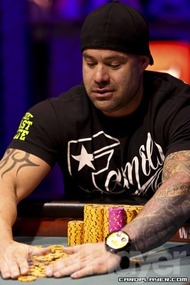






Question and Answer: Poker Pro Erik CajelaisCajelais Playing The Best Poker Of His Career |
|
|

Erik Cajelais
In 2007, he came close to scoring his first WSOP bracelet, finishing second in a $5,000 pot-limit Omaha event for another $483,755. After another runner-up finish at the WPT Turks & Caicos Poker Classic main event, Cajelais finally broke through, picking up his first bracelet at the 2009 WSOP Europe in a half hold’em, half Omaha tournament.
He’s since gone on to make six more final tables, which included another second-place finish at this year’s WSOP. In his seven-year career, Cajelais has earned nearly $2.9 million in live tournaments alone.
Card Player spoke to Cajelais to talk about career and why he believes he is playing the best poker of his life.
Logan Hronis: Can you identify one specific event in your life when you knew that you wanted to play poker for a living?
Erik Cajelais: The first time I knew I wanted to play poker for a living was the first time I saw the movie Rounders.
LH: Talk a little bit about the poker scene in Canada. Are there any differences between Canada and U.S. or Europe?
EC: Poker is way more popular in the United States. I get recognized way more often in the USA and Europe than Quebec. I can’t really speak for the rest of Canada, but it’s not that big. It’s getting bigger and bigger, but it’s still not that big.
LH: It seems you’re having a very successful 2012 thus far. Do you feel you are playing your best tournament poker now?
EC: Yes, I believe that I’m playing my best poker right now. Right now, I’m trying to play as many tournaments as possible. I’m trying to play all these tournaments exactly for that reason. I’m trying to keep my momentum going, and my confidence high.
LH: The WPT event you won in December of 2006 was a big cash for you. Looking back, how would you say that win affected your career as a whole?
EC: That win was huge for me. It was the happiest moment of my life, to that day. The money was huge, and recognition I received was amazing. That event was a huge win for myself, and for my career.
LH: You have played a good amount of WPT events as well as WSOP events. In general, which events do enjoy more and why?
EC: The Main Event at the WSOP is by far my favorite event. The World Series of Poker has so many events, and you want to do so well in them. However, if you have a bad couple of events, it seems to just go worse and worse, and you enjoy each event less and less. The WPT is one tournament with a much better structure, so you can enjoy it more.
LH: You have experienced success in both hold’em and PLO events. Which game do you prefer, and why?
EC: PLO is my favorite, by far. Especially in a cash game, since that’s what I’ve been playing for years and years. In a tournament structure, I like both hold’em and PLO, but I would still have to say I like PLO better. The reason I like it better is because it’s more rare. And, since it’s more rare, I feel I have a bigger edge in a PLO tournament, compared to hold’em.
LH: You have a reputation for being an aggressive player. What made you utilize this style?
EC: I have always been an aggressive player, more than likely because it fits my personality. Most of the players I have admired over the years have been aggressive players, so I play aggressive as well.
LH: You have played in high stakes cash games, as well as tournaments. In general, would you say your style changes between cash and tournament play?
EC: No, I don’t think my style changes much. My cash game strategy closely resembles my tournament strategy. I stay pretty much the same. I like to play a lot of hands at a table, and control the action at all times.
LH: In your opinion, do you feel that players play differently in televised events, versus non-televised ones? Why or why not?

Erik Cajelais
LH: If you woke up tomorrow, lost all interest in poker, and never wanted to play again, what would you want to pursue?
EC: I would want to be involved in business, for sure. I’m working on a few business projects right now, and I’m really excited about it. So, I certainly have that in my future, but there is also no loss of interest with poker. Poker will definitely be in my future, and I’m more motivated than ever. That’s why, lately, I’ve been taking it so seriously.
